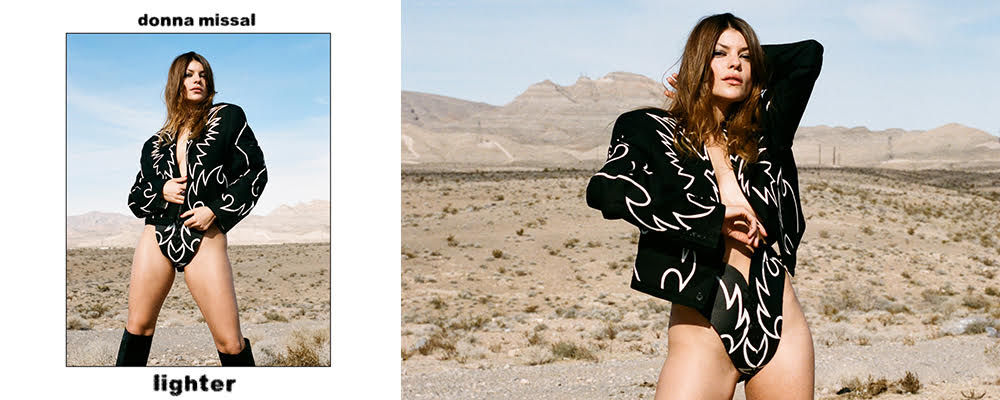Donna Missal Channels Deeper Emotions Into Broader Sonic Avenues With ‘Lighter’
Adi Mehta
When Donna Missal premiered a demo of her breakthrough single “Keep Lying” on Zane Lowe’s “Beats 1” radio show, the world immediately took notice, and Missal soon made a name for herself with a strain of emotive and soulful singing that demanded attention. Her debut album, 2018’s “This Time,” was a thoughtful exploration of artistic focus and fulfillment that channeled classic sounds into a crisp, contemporary format. For her sophomore album, “Lighter,” Missal exceeds the emotional content of her previous work, showing both a new vulnerability and command, along with a shift in musical direction that brings a broader appeal to her initial spark.
Opener “How Does It Feel” kicks off with Missal singing a few lines as expressive as always, edging things on with the suggestive titular line, and promptly bursting into a tease of a chorus that signals a bigger and brighter musical direction. The song is elemental, with every detail merely an extension of the central line, which Missal howls with full abandon, the same way she did on “Keep Lying.” “Hurt By You” switches gears considerably. Whereas the opener was all directed angst, this one is a lilting, sprightly number. Missal sings, “I’m in love with what we were / But not with you,” with a subtle twang in her voice that is just the right addition to make a line like this strike with maximum effect. There’s another booming chorus, and she wails with her trademark soulful ferocity, directed toward more general pop avenues.
“Carefully” begins breathy and intimate, and prematurely breaks into another sprawling chorus. At this point, there’s a clear shift in direction, experimenting with vaguely country-adjacent avenues. The chorus of “If you want to leave, do it carefully” is a universally relatable snippet, and Missal sings it like she means it, throwing near tantrums between choruses, and returning invariably to the core sentiment, as a twangy guitar adds closure to the thought. “Best Friend” continues in this vein, and almost overdoes it, with a quicker chorus, an even steadier feisty manner, and a tremolo guitar keeping pace, with distorted bursts striking on cue. The singsong way she sings “You were my best friend” is a perfect conveyance for a sentimentality cut short at just the right point.
This line of lyrics was bound for a moment of relative tenderness, and that comes in “Slow Motion,” a song done justice by its title, with Missal taking a breather, and stretching it into the mic, until emotions eventually give way. Even then, there’s a quick burst and a prompt return to cool composure. “Let You Let Me Down” is the overdue outburst, with Missal building up to the climactic line, “Oh the worst part is I that let you let me down,” then erupting into the most theatrical, histrionic performance so far. It’s a short-lived outburst that gives way to a repetition of resigned acceptance over quiet, plaintive piano. This segues neatly into the easy melancholy of “Bloom,” which finds Missal over a sparse acoustic guitar backdrop, delving into ‘90s, almost Alanis Morisette-style nasal outpourings. In fact, the whole song is a pastiche of ‘90s alternative radio signifiers, although it never seems forced. This might be Missal at her most emotionally unhinged yet, and the barebones backdrop makes the emotion in her voice all the more potent.
Come “Just Like You,” Missal has transitioned elegantly from R&B-adjacent to full pop. She recaps the opening number, asking repeatedly, “How does it feel,” before erupting into yet another chorus full of synth horns and the most indulgent filigree. “Who Loves You” plays up the organic element, and at moments even recalls the likes of Sharon Van Etten, although with a decidedly soul slant. There’s a conciliatory chorus that edges toward some resolution after all the chaos and catastrophe. “I’m Not Ready” rings as the final celebration, and belies its title as triumphantly as possible. The lyrics are so at odds with the music that they ring with an implicit irony, ending the album open ended, but with a firm, resolving arc.
“Lighter” is ultimately a heavier album than Missal’s debut, a record that shows her full emotional range, and takes liberties straying from the comparative confines of the last album. There are country tinges, and there are nods to ‘90s alternative rock, yet the songs still always have the voice that Donna Missal originally staked her claim with. The album is poignant and heartfelt, with highs and lows that make for a fulfilling listen, and show a singer boldly moving forward, in terms of both genre specificity and lyrical range. Altogether, it is a journey with peaks and troughs, expressed in a voice that captures the experience in its full intensity, and fashions memorable tracks out of the drama.
“Lighter” releases July 10 on Apple Music.

